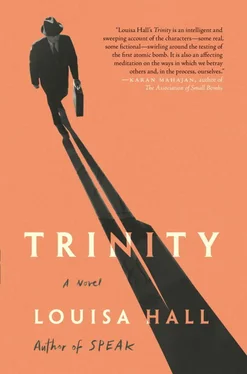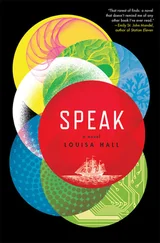It was a bit painful, to be honest, to be fixed so intently with that earnest and loving expression. It was like a light shone in your face. After a minute or two of that expression, I had to close my eyes and turn toward the pillow.
Then, getting made love to in the dark, I felt a bubble of sadness expanding inside my stomach, and I wondered if there was any more empty feeling than having a stranger moving inside you.
Lying there in the darkness, I felt like an abandoned house, wandered into by a man.
I felt like a secret closet he’d found. Or maybe more like a young girl, hiding at the back of the closet, knowing that he’d never come find me.
Yes: that’s what it was. Getting made love to by the wife beater was like one of those games of hide-and-seek when you know your hiding place is too perfect. Then night falls, and the calls of the people who know you grow faint, and you understand that you’ll always be hiding.
That’s what it felt like, it really did, and it was such a sad, empty feeling, and also so oddly like the game of getting made love to by Jack, which was a game I’d once endowed with such transformative meaning, that I felt at once as if my sorrow would eat me. Then I looked up at the wife beater and said, “You can hit me.”
He froze.
“Go ahead,” I said. “Hit me in the face if you want to.”
But this only seemed to confuse the wife beater further.
“I mean it,” I said. “I want you to hit me.”
Hovering over me in the darkness, he looked afraid. He blinked at me a few times. Then he began to earnestly make love to me once again, but by then I couldn’t lie there anymore, looking up at his fatherly, lovemaking face, allowing him to play the part of somebody tender, to atone, perhaps, for some other crime against some other woman. Then I pushed him.
“Get out of me,” I said, and headed off to the bathroom.
I STAYED ON THE TOILET FOR A LONG TIME. I WAS WAITING FOR THEwife beater to get it. I hoped eventually I’d hear the sounds of him leaving. But I didn’t hear any sounds. Then I got up from the toilet and washed my hands for a long time, until finally I felt I couldn’t hold out against the pressure of his stationary expectance.
When I went back into the bedroom, I was annoyed to discover that the wife beater was lying as if completely unperturbed by my long absence, the only difference in his position being that he’d tucked himself under the covers.
Smiling, he lifted my side of my sheet.
“You don’t have to stay over,” I said.
Jack, for instance, never stayed more than one or two hours, and was careful to always sneak home before morning.
But the wife beater had nowhere to go. There was no one left for him to deceive, his wife having already left him.
“I want to stay over,” he said.
Then I lay down beside the wife beater. I kept my face turned to the ceiling to avoid his earnest and loving expression, but even so, I felt his eyes on my face.
“Do you want to talk?” he said after a while.
“Not really,” I said.
“What’s that?” he said. “I’m sorry, I have this tinnitus.”
“NOT REALLY,” I said.
Then I turned my back to him, and soon he’d fallen asleep in the position of someone reading your book over your shoulder. He lay that way all night, breathing heavily in my ear until morning.
AS I LAY AWAKE BESIDE THE SLEEPING WIFE BEATER, I THOUGHT ABOUTJack. I remembered the troubled way he’d looked at me when I made that dumb joke, as though he’d stumbled into the ghost of an old woman he’d killed.
So he killed me, I thought. And yet, I’d always felt that he loved me.
All those months when we were together—sitting cross-legged in bed, or hiking up to the ruins, or swimming in the lake and adventuring in the brambles—I’d never felt that he wished harm upon me.
Maybe, then, I said to myself, adjusting the impression I’d formed while leaning on the centrifuge, I wasn’t actually the murdered old woman. Maybe I was only that half-wit half sister who gets accidentally axed after witnessing the intentional murder.
That, I realized, was a more logical story. When Jack came up to the mesa, he hadn’t intended to murder some orphan. He’d wanted to be involved with a moral kind of intentional murder, the deaths of enemies in declared war, and the only flaw in his execution was that he’d been interrupted by a bumbling half sister.
It was therefore understandable, I thought, that Jack hated to see me, lurking at the centrifuge, accusing him of having committed an unforgivable murder. Then I realized that if I wanted to get him to love me again, the only possible way was to demonstrate that I wasn’t dead yet, and that he hadn’t committed a crime he couldn’t ever atone for.
IN THE MORNING, WHILE TYING HIS SHOES, THE WIFE BEATER ASKEDif I was free that evening for dinner. After work, he said, he planned to attend a meeting for scientists who were concerned, now that Germany had surrendered, that we were still forging ahead with the project. Afterward he planned to eat dinner at Fuller Lodge, and he wondered if I’d be so kind as to join him.
I said I hadn’t heard about the meeting.
“It’s for the scientists,” he said.
“Which scientists?” I said.
He looked at me, his thick eyebrows furrowed. “Probably a lot of them,” he said.
“But who, exactly?” I said.
“Everyone’s concerned about going on with the weapon,” he said. “Senior scientists, especially. They think Oppie should shut down the project, now that the war in Europe is over.”
So then I told him I’d meet him there at the chapel, and that afterward we could head to dinner together, and all day, when I was putting calls through at the office, I choreographed my entrance into that meeting. I’d wear the yellow dress, I decided, and curl my hair, and try to look extremely unmurdered. I hoped to stand in the doorway illuminated by sunshine.
Around noon, however, I went outside to eat lunch and was disappointed to see a rainstorm heading toward us. It was one of those storms you sometimes saw on the mesa, coming from such a distance that it moved as an isolated disturbance in a sky that was otherwise sunny. Then I realized I’d forgotten my raincoat, and I didn’t want to show up looking sodden, so I decided to run home after work. But by the time I’d extricated myself from the office, the storm had gotten so close that I couldn’t see where it started and stopped. Now it was only the weather, the skies all around having darkened, the wind having picked up, and by the time I’d headed back out to the chapel, I was really racing the rain.
I could feel it catching up to me. Off in the distance, a couple of buffaloes had somehow gotten through the barbed wire, and they stood there in the wind, watching me with their glassy black eyes, balancing on their delicate ankles like enormous, shaggy bumblebees.
It struck me as strange and alarming, the way the wind was ruffling their fur, though otherwise they stood perfectly still, and I almost stopped to watch them for a moment. But then I kept running, trying to beat that storm to the chapel, and good thing I did, because it caught up just as I crossed the threshold.
Outside, the rain started lashing the earth, and the aspens were genuflecting like women in mourning, crying wildly and tearing their hair, and inside there was a somber, serious meeting in progress. It was a sea of scientists, all of them men. The only woman scientist on the mesa was Diz Graves, and she was pregnant, and I don’t think she was there at that meeting, because when I ran through the foyer I pulled up short before a sea of men in their work shirts, and a scientist I didn’t know was standing up at the lectern.
Читать дальше












